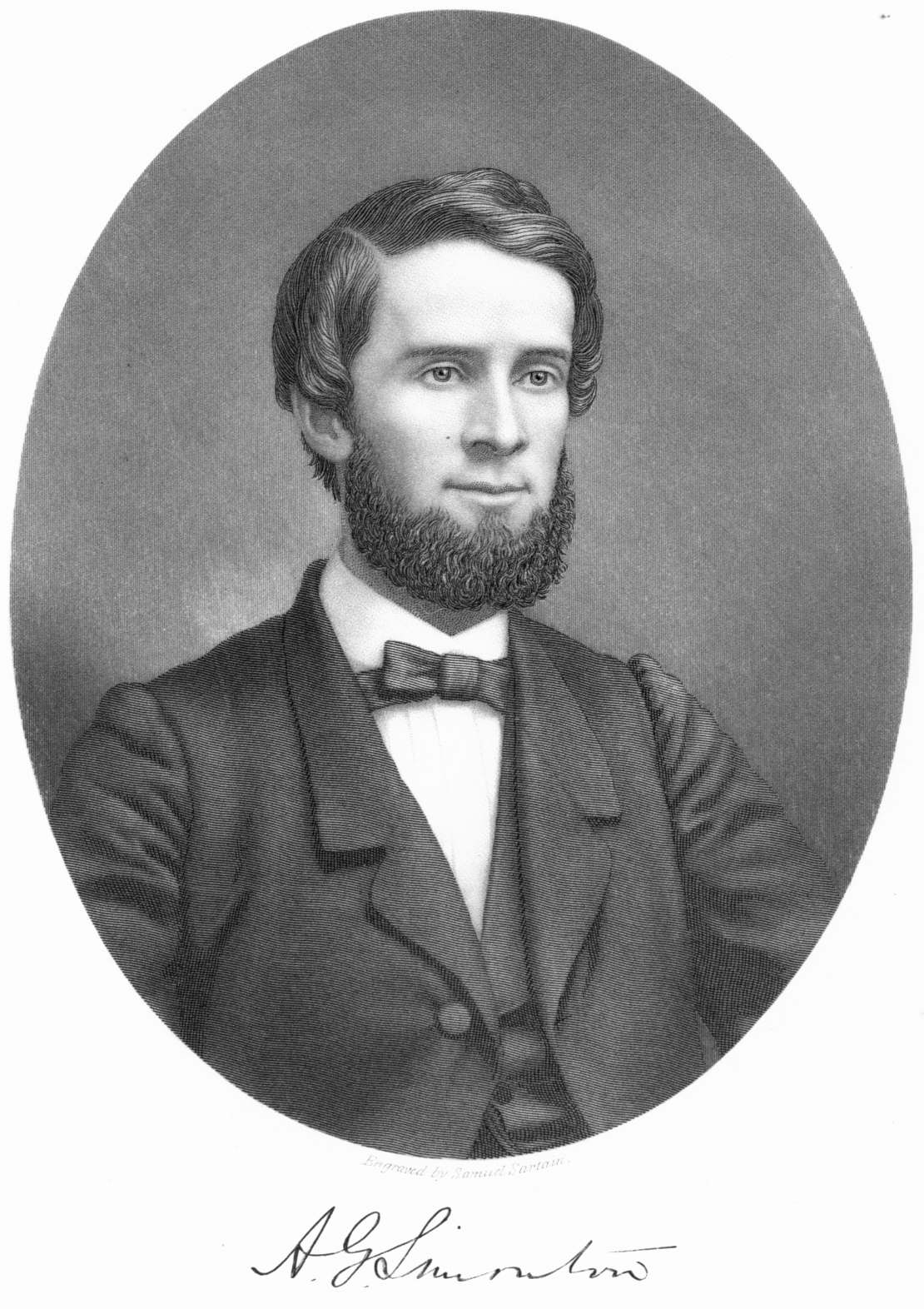Husband Rev. Ashbel Green Simonton 1

Born: 20 Jan 1833 1
Christened:
Died: 9 Dec 1867 - Brazil 2
Buried: - Brazil
Father: Hon. William Simonton, M.D. (1788-1846) 3 4
Mother: Martha Davis Snodgrass ( -1862) 5
Marriage: 19 Mar 1863 2
Wife Helen Murdock 2
Born:
Christened:
Died: 28t July, 1864 2
Buried:
Father: William Murdock ( - ) 2
Mother:
Children
General Notes: Husband - Rev. Ashbel Green Simonton
His classical education began in the Harrisburg Academy, under the tuition of the Rev. Mahlon Long. After two years' preparatory study he entered the College of New Jersey, from which he graduated in 1852, his scholarship and acquirements being of the first rank. In the autumn of the same year he went to the South with his brother James and took charge of an academy for boys in Starkville, Mississippi, where he taught with much success for eighteen months. In July, 1854, he returned to Harrisburg and entered upon the study of the law. In the spring of 1855 he decided upon a theological course, and for this purpose prepared himself for entering the theological seminary at Princeton, which he did in September of that year. He was licensed to preach by Carlisle Presbytery, which met at Greencastle on the 14th of April, 1858. He had decided upon a missionary life, and after consultation and application to the Presbyterian Board of Foreign Missions, was ordered to Brazil. He was ordained by the Presbytery of Carlisle, at Harrisburg, April 14, 1859, and on the 19th of June following sailed from Baltimore in the merchant ship "Banshee" for Rio Janeiro. He arrived at the latter place on the 12th of August, and at once entered upon his field of labor. In November, 1864, he took the lead in the establishment of the Imprensa Evangelica, a semi-monthly newspaper for the dissemination of religious information among the people of Brazil. Although the demands made upon him of an editorial character were severe, in addition to preaching thrice per week in Portuguese and generally once in English\emdash the latter to the English Americans living at Rio\emdash yet they were met con amore. Having acquired facility in the use of the language, he composed with great ease and pleasure to himself. Educated Brazilians acknowledged their surprise at the elegance and force with which he wrote in their native tongue, and his leading articles in the Imprensa were characterized by great ability, clearness, and comprehension of the subjects treated. The paper continued to be with him a favorite means of spreading the truth among the native population of Brazil.
In the spring of 1862 he returned to the United States, was married in March, 1863, and sailed for Brazil May 23, 1863, reaching the harbor of Rio on the 16th of July. His wife died after a short illness the next summer. But he labored zealously for the Master. Towards the close of March, 1865, he made a missionary tour into the province of Sao Paulo, returning to his post in Rio early in May.
The news of Lee's surrender, of the suppression of the Great Rebellion, and of the assassination of President Lincoln, reached that city in quick succession. When there was no longer a doubt that the last-mentioned sad event had occurred, he was requested to preach a sermon to the American residents on the occasion, which was delivered at a special service on May 21, 1865, to the largest assembly of his countrymen ever convened at Rio. The discourse was remarkable for its breadth of view, its philosophical tone, its enlightened and ardent patriotism, and for the force and eloquence with which it set forth the duty of trust in God under the overwhelming calamity that had fallen upon our country. Near the close of 1865 the Presbytery of Rio de Janeiro was organized at Sao Paulo, that being the mission station of his brother-in-law, Rev. A. L. Blackford.
It was soon perceived that his overtaxed energies had begun to give way under the gradual approaches of the disease which forever ended his earthly activities. Unable to continue his labors, he left Rio for the home of his sister, at Sao Paulo, the last week in November, 1867. No relief came, and after a brief illness he died on the 9th of December following. He was buried on the same day from the little church of Sao Paulo, two Englishmen and two Americans officiating as pall-bearers, addresses being made in Portuguese by Rev. Mr. Blackford and Rev. Emanuel Pires, singing the hymn,\emdash
"Fallamos do munde feliz."
("We speak of the land of the blest.")
A large procession was formed, proceeding to the Protestant cemetery, where "upon a hillside overlooking the city of Sao Paulo, toward the plain where Brazil's cry of independence was first uttered and still echoes," they laid the faithful missionary to his final resting-place.